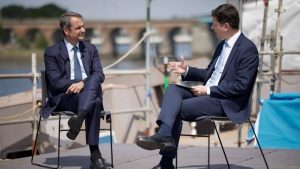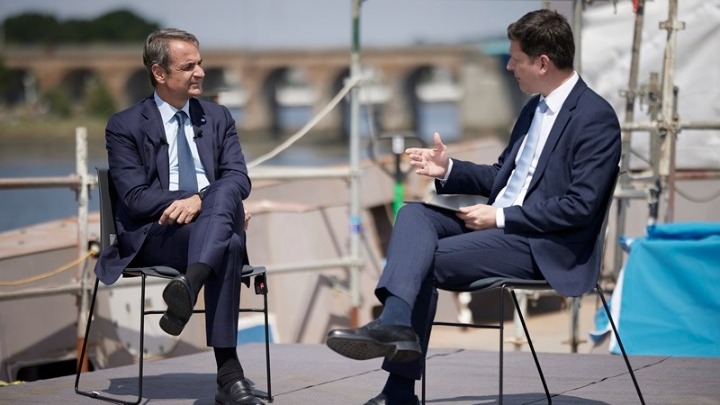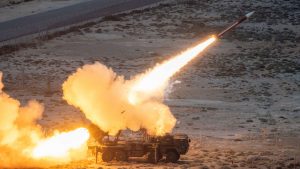The Prespa Agreement and the use of a single name (erga omnes) for the neighboring country “was the basic prerequisite for North Macedonia to become a member of NATO; that is the reason it was not accepted in NATO all these years,” Prime Minister Kyriakos Mitsotakis said during an interview to national broadcaster ERT on board the frigate ‘Kimon’ at the Naval Group shipyards in Lorient, France, on Thursday.
Responding to media comments by prime-minister-elect Hristijan Mickoski that he would respect the Prespa Agreement but call his country “Macedonia” instead, Mitsotakis said, “I consider it unacceptable that North Macedonia will be able to attend its first (NATO Summit) with its new leadership and cast the Prespa Agreement into doubt over the name.”
The Greek premier said once Mickoski is sworn in, it will be the first time the two leaders will meet, and that at the NATO Summit in July, the alliance’s 75th anniversary. “We managed to have good relations and support its progress toward Europe. But I do not think North Macedonia could take steps toward Europe by opening a new and unnecessary front with Greece,” the PM said.
Among other issues, the Greek prime minister reiterated the need for a unified European defense strategy and a related defense fund, resembling the Recovery Fund, while he added that he and French President Emmanuel Macron “were the first to speak of the need for Europe’s strategic autonomy, before even the Russian invasion of Ukraine.” This, he said, requires more European collaboration, and “it is not accidental that we decided to build our ships at a French shipyard.”
The issue of a unified defense fund “must be linked as well with some large projects of strategic priority for Europe, that could unify European industry and offer added value to our joint defense concerns.” He said the issue would be included in the new European Council agenda. “At the end, the issue is whether national budgets can support increased expenditures we all recognize we must carry out for our defense in an environment of fiscal discipline,” Mitsotakis said.
Europe in general he noted “has fundamentally ceded its defense and its security guarantees to NATO and the US,” while the political situation in the US was unknown, with presidential elections. This conversation has started, he added.
Speaking of Greek-Turkish relations, the Greek premier said that although relations had improved significantly, “this does not mean Turkiye has changed its positions” or its underlying revisionism, which directly doubts the sovereignty and sovereign rights. We are not naive. If we were, we would not be building these ships.”
As to the planned marine parks project will go ahead, and that Turkiye, like Greece, can do whatever it wants within its territorial waters. He reiterated that the purpose of talks at foreign minister level is to focus on the core difference, in terms of the delimitation of the Exclusive Economic Zone and the continental shelf on the Aegean and the East Mediterranean.
It would be good if this dialog continues, without it meaning that we will necessarily agree,” Mitsotakis said. He added that the two countries were workng well in the migration issue, and that the atmosphere had changes, without this meaning Turkiye changed its positions.
This is a great responsibility for the country, which serves a principled policy, Mitsotakis said. He added that Greece’s decisions may not make everyone happy, but Greece has a lot to offer. In addition, the Cyprus issue may possibly be supported by Greece’s membership on the Security Council, the PM said, adding that Greece supports the UN Secretary-General’s Personal Envoy on the Cyprus issue, Maria Angela Holguin.
(Greece was elected among five candidates, and will serve on the Security Council in 2025-2026. It is the third time the country is elected as non-permanent member on the UN Security Council.)
The Greek PM also said Greece supports the recognition of a Palestinian state, it is in favor of the two-state solution, but the issue is how to get there, and the first priority is to have clashes end, Israel withdraw, and hostages be freed.
Mitsotakis paid his first-ever visit to the shipyard that will build a total of three Belharra frigates for the Hellenic Navy, with the delivery completed in 2026. Kimon, which has been floated out at the present, is expected to be delivered to Greece in 2025. One of the nine blocks the frigates require will be built in the Salamis Shipyards in Greece, he noted.
Following the visit to Lorient, he was scheduled to attend the 80th anniversary of D-Day in Normandy – to which Greece contributed two corvettes – before returning to Greece.







